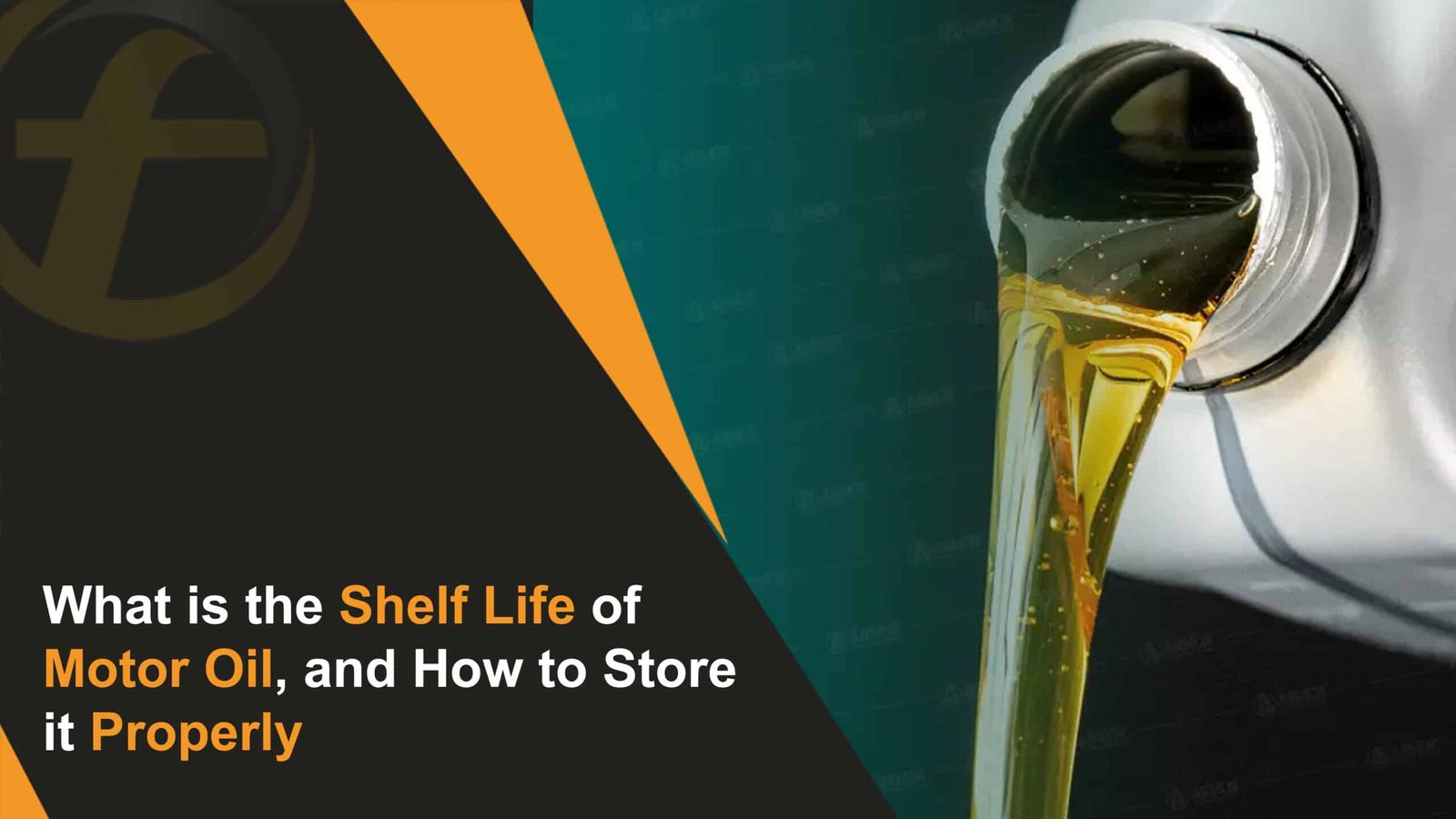Have you ever found yourself staring at that half-used bottle of motor oil in your garage, wondering if it’s still good to use? You’re not alone.
Many drivers and vehicle owners ponder the same question: “How long can I store motor oil? ” Whether you’re a seasoned car enthusiast or just someone who likes to do a bit of DIY maintenance, understanding the shelf life of motor oil is crucial.
Using expired oil can lead to engine problems, costing you time and money. By the end of this article, you’ll have a clear understanding of how long you can keep that motor oil and when it’s time to let it go. So, let’s dive in and ensure your engine gets only the best care.
Shelf Life Of Motor Oil
Understanding the shelf life of motor oil is crucial for maintaining the health of your vehicle’s engine. Many drivers overlook the importance of storing motor oil correctly, which can lead to diminished performance or even damage to the engine. How long can you really store motor oil before it loses its effectiveness? Let’s dive into some practical insights to help you keep your engine running smoothly.
What Is The Shelf Life Of Motor Oil?
Motor oil, like most products, has a shelf life. Typically, unopened motor oil can last for about five years. However, various factors can influence this timeframe.
Storage conditions play a significant role. Extreme temperatures or exposure to moisture can degrade the oil faster. Always store your oil in a cool, dry place.
Have you ever found a dusty bottle of motor oil in your garage and wondered if it’s still good? You’re not alone. Many people are surprised to learn that even unopened bottles can degrade over time.
How To Tell If Your Motor Oil Has Expired
Expired motor oil can affect your engine’s performance. Look for signs like changes in color or consistency. If the oil is cloudy or has separated, it’s time to discard it.
Another clue is the expiration date printed on the bottle. While it’s a good guide, assessing the oil’s physical condition is equally important.
Have you ever used expired oil and noticed your engine running rough? It might have been the oil’s fault. Always check before you pour.
Storing Motor Oil For Longevity
Proper storage can extend the life of your motor oil. Keep it in a sealed container away from direct sunlight and humidity.
If you’re storing oil for a long time, consider placing it in a cabinet or shelf rather than on the floor. This reduces the risk of contamination.
Think about your garage setup. Is your motor oil stored safely? A few tweaks could save you from a costly engine repair.
Is It Worth Stocking Up On Motor Oil?
Buying motor oil in bulk can save money, but is it worth it? Consider how often you change your oil and whether you have space to store it properly.
If you drive frequently, stocking up might be a smart move. However, if your car sits idle, you may want to buy oil as needed.
What’s your driving habit like? If your vehicle is your daily companion, having extra motor oil at hand could be beneficial.
In the end, understanding motor oil’s shelf life is about balancing practicality with precaution. Always check your oil and store it wisely to keep your vehicle running smoothly.

Credit: www.yourmechanic.com
Factors Affecting Longevity
Understanding how long motor oil can be stored is crucial. Many factors influence its longevity. Knowing these factors ensures your engine runs smoothly. Let’s dive into what affects motor oil’s shelf life.
Storage Conditions
Storage conditions play a huge role in oil longevity. Keep motor oil in a cool, dry place. Extreme temperatures can degrade its quality. Avoid direct sunlight to prevent oxidation. Exposure to air can also affect its lifespan. Ensure the storage area is clean and free from moisture.
Type Of Motor Oil
The type of motor oil affects its storage time. Synthetic oils last longer than conventional ones. They resist oxidation better. Conventional oils may break down faster. Blended oils fall somewhere in between. Always check the manufacturer’s recommendations for specific storage durations.
Packaging Integrity
Packaging integrity is crucial for storage. Ensure the container remains sealed and intact. A damaged seal can lead to contamination. Contaminants can reduce the oil’s effectiveness. Always inspect the packaging before storing. Replace any damaged containers to maintain oil quality.
Signs Of Expired Motor Oil
Motor oil is essential for keeping your engine running smoothly. But did you know that motor oil can expire? Recognizing the signs of expired motor oil can save you from costly repairs and ensure your vehicle’s longevity. Let’s dive into the key indicators that your motor oil may have passed its prime.
Changes In Appearance
One of the first things you might notice is a change in the oil’s appearance. Fresh motor oil is typically golden or amber. If your oil looks darker or sludgy, it might be time to change it. It’s like noticing a bruise on fruit—something’s not right.
Unusual Smell
Take a whiff of the oil. Does it smell off or burnt? Motor oil should have a mild petroleum scent. A strong or unpleasant odor indicates that the oil has degraded. Imagine the smell of spoiled milk; it’s a clear signal something’s gone wrong.
Sediment Formation
Sometimes expired oil can develop sediment. If you see particles or sludge at the bottom of the container, the oil has likely broken down. It’s similar to finding sand in your shoes after a walk on the beach—it’s unexpected and unwanted.
Have you ever checked your motor oil and wondered about its shelf life? These signs can help you make an informed decision. Could ignoring these indicators lead to engine trouble? Absolutely. By regularly checking your motor oil, you can keep your engine running smoothly and avoid costly repairs.
Credit: www.cityofalhambra.org
Proper Storage Techniques
Motor oil can be stored for up to five years if kept in a cool, dry place. Ensure the container is sealed tightly to prevent moisture and dirt from entering. Always check the oil’s expiration date and appearance before use to maintain engine health.
Proper storage of motor oil can significantly extend its shelf life. It’s not just about finding a spot in your garage; it’s about creating the right conditions. Understanding these storage techniques will save you time, money, and the hassle of dealing with degraded oil.Temperature Control
Motor oil should be stored in a cool, stable environment. Extreme temperatures can alter its chemical composition. Aim for a consistent temperature, ideally between 40°F and 85°F. Storing oil in a shed that gets too hot or too cold can reduce its effectiveness. Consider using a basement or an indoor storage room. Have you ever noticed how your car struggles in extreme weather? Your motor oil feels the same way.Avoiding Moisture
Moisture is motor oil’s worst enemy. Even a small amount can cause contamination. Always check that the storage area is dry and free from leaks. Consider using a dehumidifier if you live in a humid climate. A friend of mine learned this the hard way when his oil turned milky due to moisture intrusion. Don’t let that happen to you.Sealed Containers
Keeping oil in its original, sealed container is crucial. Once opened, the oil’s exposure to air can degrade its quality. Always reseal the cap tightly after each use. If you transfer oil to another container, make sure it’s clean and airtight. Have you ever left a soda open only to find it flat later? The same principle applies here—seal it tight to keep it fresh. Taking the time to store your motor oil properly is worth it. How often do you find yourself replacing oil that you thought would last? By controlling temperature, avoiding moisture, and ensuring sealed containers, you maximize your oil’s lifespan and your peace of mind.Motor Oil Disposal
Motor oil disposal is crucial for environmental protection. It involves getting rid of used oil safely and responsibly. Improper disposal can harm both nature and human health. Understanding the right methods ensures safety and helps in preserving the planet.
Environmental Considerations
Used motor oil contains toxic substances. It can contaminate soil and waterways if not handled properly. The oil does not break down easily, which makes it a persistent pollutant. This can affect wildlife, plants, and water quality. Safe disposal minimizes these environmental risks.
Safe Disposal Methods
Take used motor oil to a recycling center. Most local garages and auto shops accept it. They have proper systems to recycle or dispose of oil safely. Some communities offer curbside pickup services for used oil. Always store used oil in a sealed container. Label it clearly before disposal. Never pour motor oil down drains or on the ground. Such actions can lead to severe environmental damage.
Common Myths
Many think motor oil lasts forever on the shelf, but it doesn’t. Typically, motor oil remains usable for about five years if stored properly. Cool, dry places are best to keep it from degrading.
Storing motor oil properly is crucial for maintaining its effectiveness and ensuring your vehicle runs smoothly. However, there are numerous myths surrounding how long you can actually store motor oil. Let’s debunk some of these common misconceptions, so you can make informed decisions about your oil storage.Indefinite Shelf Life
Many believe motor oil has an indefinite shelf life. This couldn’t be further from the truth. While motor oil is designed to last, it doesn’t mean it will stay good forever. Typically, motor oil can be stored for about 2-5 years, depending on the type and storage conditions. Factors like heat, light, and contamination can degrade its quality. Always check the expiration date on the container and store it in a cool, dry place to extend its life.Reusing Old Oil
Some car enthusiasts claim that reusing old oil is perfectly fine. However, this is a risky move. Used motor oil contains impurities and breakdown products that can harm your engine. Consider this: would you use old cooking oil for your meals? The same principle applies to your car. Fresh oil ensures optimal performance and reduces wear and tear on engine parts. If budget constraints make you consider reusing oil, think about the long-term cost of engine damage. It’s always more economical to invest in fresh oil than to pay for significant engine repairs later. So, what myths have you heard about motor oil? Share your thoughts, and let’s debunk them together!Expert Recommendations
Storing motor oil properly is crucial for maintaining its quality. Experts offer valuable insights on how to do this effectively. Their guidance can help you ensure your motor oil remains in good condition for future use.
Manufacturer Guidelines
Manufacturers provide specific storage guidelines for motor oil. They recommend keeping the oil in a cool, dry place. Heat and moisture can degrade the oil’s quality. Always check the label for storage instructions. These guidelines are based on extensive research and testing.
Professional Advice
Professionals suggest using motor oil within five years. They emphasize checking the oil’s appearance before use. If the oil looks cloudy or has changed color, it may be spoiled. Properly sealed containers extend the oil’s shelf life. Always store the oil upright to prevent leaks.

Credit: fubex.net
Conclusion
Proper storage of motor oil extends its lifespan. Choose a cool, dry place. Keep containers sealed tightly. Always check for signs of contamination. Regularly rotate your stock. Use older motor oil first. Remember, good storage practices ensure quality. Discard expired oil responsibly.
Protect the environment and your engine. Following these tips saves you money. It also ensures your vehicle runs smoothly. Be mindful of oil dates. This helps avoid engine problems. Maintain a routine for checking and using oil. Proper storage and usage keep your car in top condition.
Stay informed, stay prepared.
